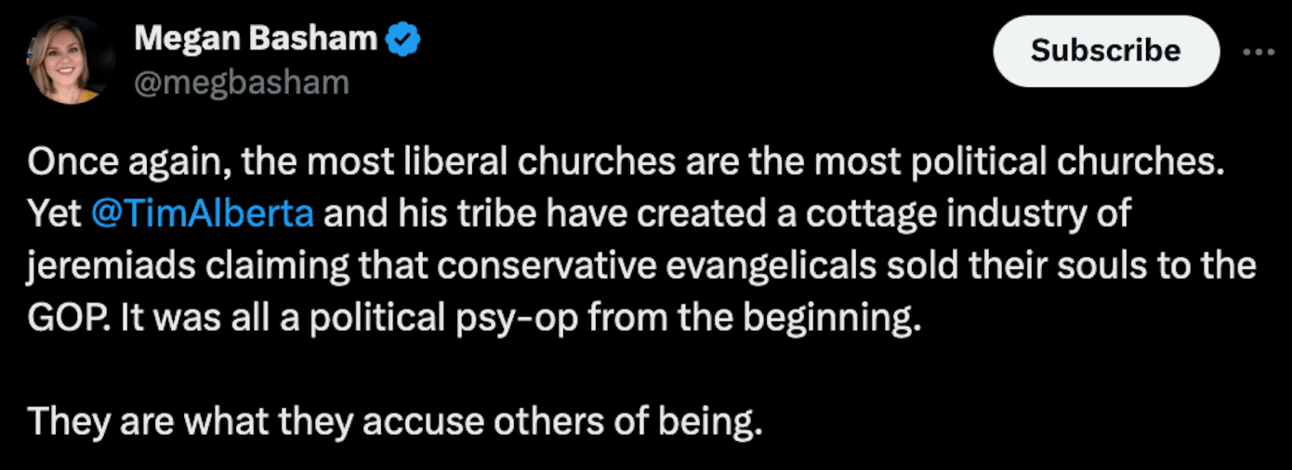It's Saturday, December 14, 2024.
Today’s edition covers which Christian denominations are most and least politically active, a smattering of Christian news from the U.S. and beyond, and the Council of Trent and its profound, lasting legacy.
“Hear instruction and be wise, and do not neglect it.” (Proverbs 8:33)
Of Christian Concern
LIBERAL DENOMINATIONS ARE MORE POLITICALLY ACTIVE THAN THEIR CONSERVATIVE COUNTERPARTS

Faith Counts Research Director Ryan Burge posted on Tuesday morning:
The most politically active Protestant denomination in 2020 was:
The Episcopal Church
The United Church of Christ
PCUSA
The average Southern Baptists engaged in about half as many political acts as the average Episcopalian.
Burge drew this conclusion from his mid-October analysis of data collected by the Cooperative Election Study, which asked people about their engagement in six different political activities:
Attending a political meeting
Attending a protest or march
Contacting a public official
Donating money to a candidate
Putting up a political sign
Working for a candidate or campaign
Looking at “the 20 largest Protestant denominations in the data,” Burge’s analysis highlights several points:
“The two groups that are the most likely to donate to a candidate or campaign are members of the Episcopal Church and the United Church of Christ.”
The rank ordering is “incredibly consistent . . . from one activity to another” — meaning, the groups that are more likely to engage in one political activity are also more likely to do so through another.
The broad trend: “mainline Protestant groups were much more politically involved in 2020 compared to the average evangelical tradition” (see graph above).
In 2020, the average member of the Episcopal Church and the United Church of Christ “engaged in at least 1.6 [of the six political] acts.”
By contrast, the average Southern Baptist “engaged in .79 activities.”
“The average Episcopalian is more politically engaged than the average atheist.” However, “There just aren’t that many Episcopalians in the United States. In this sample, it’s about 700 Episcopalians, while there are about 3800 atheists. So while the Episcopalians do have a higher rate of political participation, in terms of numbers of boots on the ground - the atheists have them beat by a long shot.”
Evangelical groups like Southern Baptists (the largest denomination in the nation) “showed lower levels of individual political engagement. This disparity suggests that the political influence of some religious groups may stem more from their sheer size than from the individual engagement of their members.”
Here’s a small sample of the responses to Burge’s Tuesday post:




Also Noteworthy

→ Muhammad was the most popular name in England and Wales in 2023, according to new census data.
→ Pope Francis has dedicated a “special jubilee pilgrimage” to “Catholic homosexuals and LGBT people,” Breitbart News reports.
→ Pastor Mojtaba Ahmadi fled to Turkey after being tortured in Iran for 170 days but has now been detained by Turkish authorities “on questionable charges,” the American Center for Law and Justice (ACLJ) reports. He is at risk of deportation back to Iran, where he could be subject to more torture. ACLJ is soliciting signatures for a petition that seeks “to stop this unjust expulsion and secure Pastor Mojtaba's safety.”
→ Harold McQuaker, the 77-year-old mayor of Emo, a township in Ontario, Canada, was reportedly fined $5,000 and ordered to take a “Human Rights 101” course for discrimination against an LGBTQ group. His discriminatory act? Denying the group’s request to proclaim June as Pride Month and fly an “LGBTQ2” flag, and commenting on the request during a town council meeting, noting there is no flag for the “other side of the coin… for straight people.” McQuaker stated he would refuse to pay, and the LGBT group Borderland Pride allegedly “took immediate action to garnish his account.”
→ Pastor Joseph Spurgeon of Sovereign King Church, with the support of Pastor Joel Webbon of Covenant Bible Church and others, released a “Statement on Natural Affection,” which is “a statement on racial ideologies threatening the Church.” It outlines a perspective on proper loyalties regarding family, church, nation, etc., and condemns race-based ideologies that seem to have a growing number of advocates among some professing Christians.
Spurgeon wrote that the statement “has accomplished exactly what I intended it to do”: it offered “a clear foundation” to unify “pastors like Joel Webben, Doug Wilson, Uri Brito, Jerry Dorris and others across different perspectives” but “excluded those who couldn’t affirm it.” He claims, “This effort hasn’t just kept out Nazis and other radicals; it’s also exposed the weaknesses in their arguments.”
→ Pete Hegseth, President-elect Donald Trump's Secretary of Defense nominee, says he loves Jesus in an interview with Megyn Kelly: “We love this country, we love Jesus Christ our Savior, and we’re going to fight like h***.”
→ 29 abortion centers closed this year, Life News reports. Still, according to an analysis by the Foundation to Abolish Abortion, no state is abortion-free. Even the 16 states with abortion "bans" may have had 62,077 self-managed abortions in a 12-month period.
RELATED: Kristen Welker of NBC News observed in her recent interview with Donald Trump that abortions by pill account for over half of U.S. abortions. Trump told Welker he is unlikely to restrict pill abortions, but he was unwilling to “commit” to that position, saying, “Things do change, but I don’t think it’s going change at all.”
Content Catch-Up
Recent, notable content of Christian interest.*

Screenshot from the debate.
→ Carson vs. Huff On Bible and History: In October, a debate was recorded between Billy Carson, an expert in Ancient Civilizations known for “public and widely dispersed criticisms and critiques regarding the Bible and Historic Christianity,” and Wes Huff, a PhD candidate in New Testament studies. As an idea of how it went, Carson “attempted to suppress the footage” and threatened to sue Huff for publishing clips from the conversation, according to Huff’s formal response to a cease and desist letter last week. Watch the entire unedited debate here. (Debate)
*Not necessarily an endorsement
Church History Tidbit
The Council of Trent

Council of Trent, painting in the Museo del Palazzo del Buonconsiglio, Trento. (Laurom / CC BY-SA 3.0)
The Council of Trent (1545-1563) “was a conference held by Catholic clergy to reform abuses and errors in the Church and affirm traditional Church teachings and authority.” It was “convened by Pope Paul III (served 1534-1549) in response to the Protestant Reformation” and launched the Counter-Reformation.
The council met for three sessions in a span of 18 years (1545-1549, 1551-1552, and 1562-1563), and its key decisions included:
Doctrine Clarification: It reaffirmed core Catholic doctrines, such as the authority of Scripture and Tradition, justification through faith and works, and the seven sacraments.
Scripture and Canon: It declared the Latin Vulgate the official Bible and defined the biblical canon, including the Deuterocanonical books rejected by many Protestants.
Church Reforms: It addressed church corruption by enforcing clerical discipline, requiring bishops to reside in their dioceses, and establishing seminaries for priestly training.
Liturgy and Sacraments: The council standardized the Mass, leading to the creation of the Tridentine Mass, and reaffirmed the Real Presence of Christ in the Eucharist.
Trent’s legacy is profound. It firmly distinguished Catholic doctrine from Protestant doctrine, inspired the founding of religious orders like the Jesuits, helped spur the Baroque artistic movement, and more. Many of its decisions remain in force today, especially regarding doctrine and ecclesiastical structure. However, the Tridentine Mass is no longer the exclusive standard, and Vatican II’s more ecumenical approach softened the rejection of Protestants and their beliefs.

